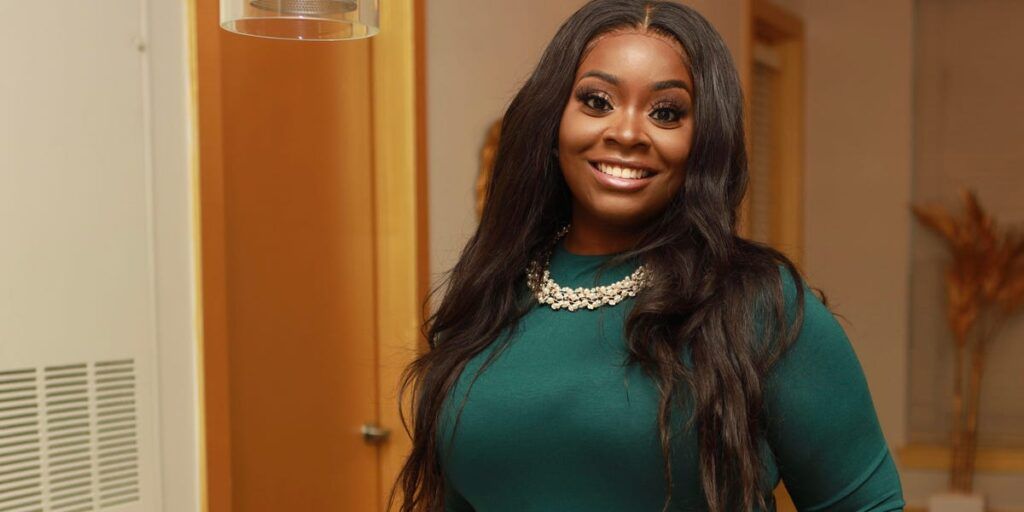Courtesy of Jasmine McCall
- Jasmine McCall sells digital kits that help people improve their credit by disputing inaccuracies.
- She needed a way to make passive income that was COVID-safe and required no overhead.
- Her digital products, which she promotes on YouTube, have earned her six figures.
Jasmine McCall was eight months pregnant when her nine-to-five business consulting job let her know that it was cutting her pay significantly. Even though her husband was still able to cover his share of the expenses, she scrambled to figure out how she would make enough money to take care of her growing family.
“I’ve always been a fan of ‘sleep coin,'” 30-year-old McCall told Insider, “the idea of making money while you sleep.” Since her doctor prescribed bed rest late in her pregnancy, McCall was looking for a business model that required no overhead, that was COVID-safe, and “could run without me most days.”
Her original goal was to make a $1,000 per month to cover the cost of daycare, but she quickly exceeded that goal after releasing her first YouTube video in August 2021. Here’s how McCall made $100,000 in passive income in four months.
She created a digital product to help people improve their credit scores
In the past, McCall struggled with poor credit history due to unpaid medical bills. She comes from a family with six siblings, raised by a single mom, who used welfare benefits to try to make ends meet and could never afford health insurance.
At first, McCall dutifully paid the medical bills, but she soon realized that it still didn’t improve her credit score. After hours of research, she learned that collection agencies were collecting illegal fees on top of the debt she actually owed. She started writing dispute letters to credit bureaus to get the debt removed from her credit report. After filing the disputes, her creditors forgave her debt altogether, and her credit score jumped by 100 points.
McCall’s friends soon asked her to help them boost their credit, too. “For the first couple of years, I would just coach my friends on how to fix their credit scores,” she said. Eventually, so many people were asking for her help that she decided to sell a digital package with dispute letter templates people could use.
Now, she sells three digital products that help people stack wealth through a platform called GetDPD: a $7 Ultimate Resume Kit, a $27 Ultimate Credit Boost Kit, and a $37 Ultimate Homebuyer’s Kit.
She promoted her digital products on YouTube
In summer 2021, an eight-months-pregnant McCall decided to kick her digital business into high gear by promoting products on YouTube, explaining every single step of the credit report dispute process and linking her products in the video’s description.
“The YouTube algorithm liked the video,” says McCall, “and I learned that I only needed 1,000 subscribers and 4,000 minutes of watch time in order to become monetized on YouTube.” Her content is classified as educational content on YouTube, and brands like Carvana and Experian pay her to advertise related products at the beginning of her videos. Between September and December 2021, she earned $3,000 per month in YouTube ad revenue.
At that point, McCall researched best practices for search engine optimization, to make sure the YouTube algorithm would connect her content to her audience. “I didn’t go into it with the intention of becoming a creator,” she added, “but there were just so many additional questions that I had to keep making content.”
She sold an average of $25,000 worth of digital products per month from September to December 2021, according to records viewed by Insider.
“At this point in my life, I’ve done really well for myself, but I will never forget the feeling of constantly being rejected because my mom had bad credit,” McCall continues. Raising six kids alone, her mother struggled with her mental health after being frequently harassed by debt collectors threatening to repossess her car or auction off items in her home.
“The demographic I had in mind when I started making videos were people like me who had grown up on welfare, with very limited educational resources; single moms that didn’t have health insurance,” McCall says. “When I make these videos, it’s like I’m talking to my mom from back in those days, if she had someone to help her with her credit.”
This content was originally published here.




